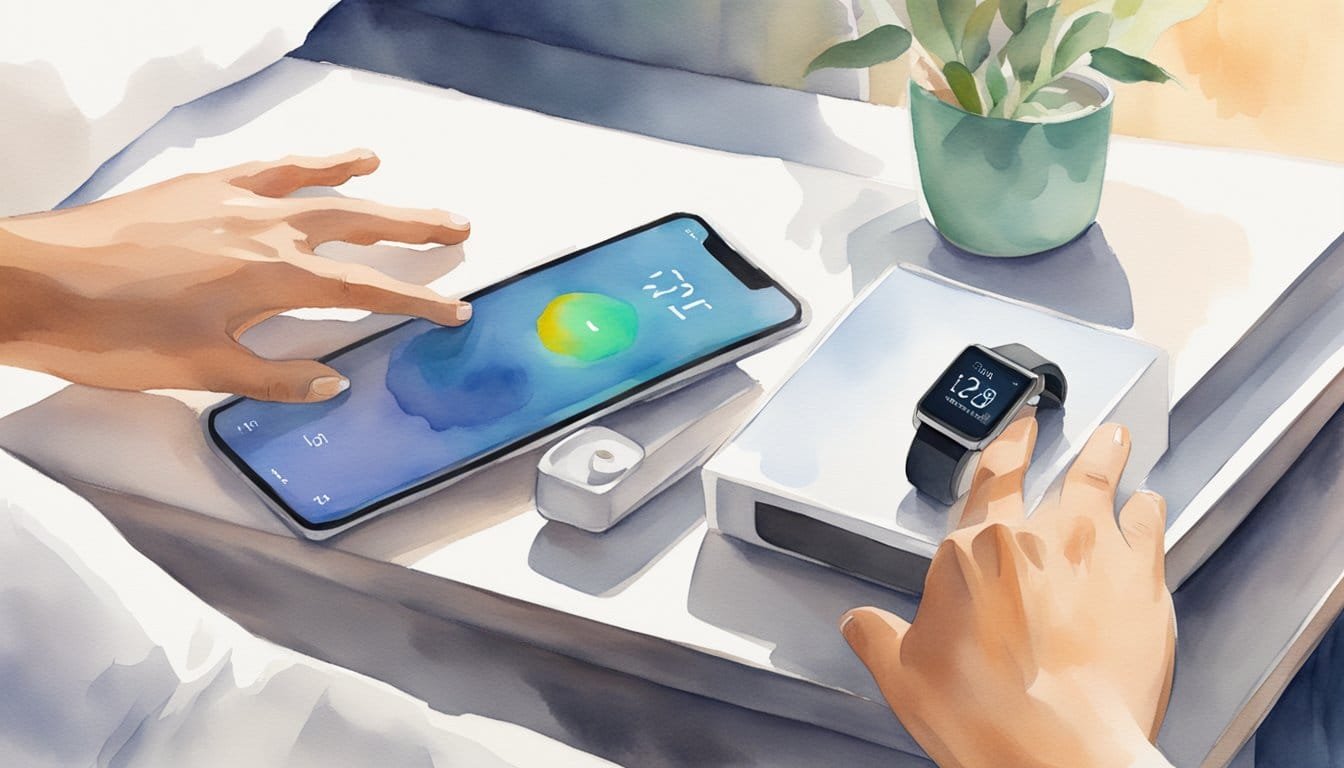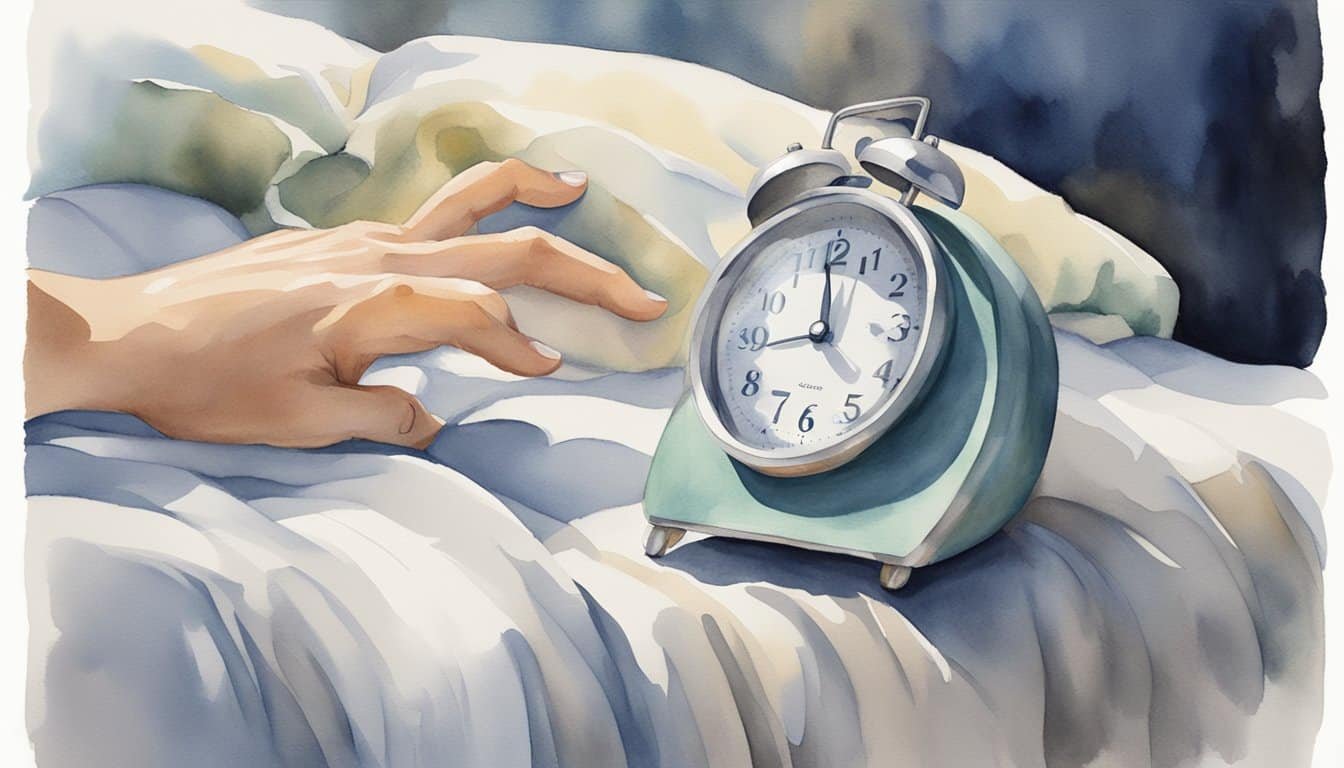Understanding Snooze and Sleep
Hitting the snooze button may seem like a harmless way to grab a few more minutes of sleep, but it can interfere with the body’s natural waking process and the intricacies of sleep cycles.
What is Sleep Inertia?
Sleep inertia is that groggy feeling one might experience immediately after waking up, characterized by reduced motor dexterity, a sense of disorientation, and a desire to return to sleep.
It’s a transitional state between sleep and wakefulness, and its intensity varies based on the particular sleep stage one is in when the alarm goes off.
The use of a snooze button can exacerbate sleep inertia by fragmenting the last part of sleep.
Sleep Cycles and Stages
Understanding sleep requires diving into the sleep cycle, which is composed of multiple stages including REM (Rapid Eye Movement) sleep and three stages of non-REM sleep.
The cycle repeats several times throughout the night, with REM sleep occurring more in the second half of the night.
Disrupting these stages with a snooze alarm can impede the body’s circadian rhythm, the internal clock regulating sleep and wakefulness.
Timing is crucial, as awakening from a lighter sleep stage can mean less grogginess, whereas being jolted awake during a deep sleep or REM phase can start the day off with unwelcome drowsiness.
Health Implications of Hitting Snooze

Hitting the snooze button might feel like a small morning indulgence, but it can have surprising implications for one’s health, including the quality of sleep and overall daily performance.
Impact on Sleep Quality
When someone hits the snooze button, they fragment what could be restful sleep into brief and superficial dosing. Fragmented sleep can reduce the overall sleep quality by interrupting the natural sleep cycle.
Studies suggest that during these extra minutes of snoozing, one cannot dive deeply enough into the restorative stages of sleep, leading to feelings of grogginess and suboptimal alertness upon waking.
Snooze Button and Sleep Disorders
The temptation to hit the snooze button can be a signal of underlying sleep disorders.
Conditions like insomnia or sleep apnea might make a regular, undisturbed sleep schedule difficult.
In turn, the misuse of a snooze button may exacerbate the symptoms of these sleep disorders, creating a problematic loop that can be hard to escape.
How Snoozing Affects Mood and Performance
The first study that examines snoozing’s effect on mood indicates that those who snooze might feel an initial mood boost.
However, this temporary increase doesn’t necessarily translate to better performance throughout the day.
Disrupted sleep can affect both mood and cognitive performance, including functions like memory, attention, and decision-making.
Consistent snoozing can lead to a less effective start to the day, which might drag down one’s spirits and productivity.
Best Practices for Waking Up

Waking up refreshed hinges on a few key habits, including establishing a strong sleep routine and minimizing disruptive snooze habits.
Let’s explore how to fine-tune mornings for a brighter start to the day.
Improving Sleep Hygiene
Good sleep hygiene could mean the difference between a sluggish morning and leaping out of bed with energy.
Those striving for consistent sleep should aim for a regular sleep schedule by hitting the hay and waking up at the same times every day.
This regularity helps to set the body’s internal clock and can improve the quality of uninterrupted sleep.
Additionally, creating a restful environment, free from noise and light, encourages deeper, more restorative sleep.
Alternatives to Multiple Alarms
The blaring of multiple alarms might seem like a foolproof way to leave bed, but it can disrupt sleep patterns and contribute to morning drowsiness.
Instead, consider waking up with a single alarm with a pleasant tone and place it across the room.
This not only reduces the temptation to hit snooze but also physically necessitates getting out of bed to switch it off.
Experiments have noted that one alarm could be more beneficial than several.
Interventions for Morning Drowsiness
When sleepiness clings like a stubborn fog, simple interventions can help clear the mind.
Stepping into bright light prompts the body to suppress melatonin, the sleep hormone, and energizes the system.
Engaging in gentle stretching or a brisk walk can raise body temperature and heart rate, shaking off the vestiges of sleep.
For those who struggle to emerge from the comforting cocoon of their duvet, research suggests that selecting alternative methods to wake can reduce sleep inertia.
Biological and Psychological Effects

When one hits the snooze button, it’s not just those extra minutes of sleep they’re playing with – it’s the complex interplay between their hormones and mood.
Cortisol and Wakefulness
Cortisol, known as the stress hormone, follows a daily rhythm that’s tightly intertwined with our internal clock.
Ideally, cortisol levels ramp up about 30 to 45 minutes after waking, in a process called the cortisol awakening response (CAR), to help the body transition to a state of wakefulness.
Messing with this process, such as through inconsistent wake times due to snoozing, can confuse the body and potentially dampen the CAR, making it harder to feel alert.
Research around the effects of a snooze alarm on waking sheds light on these nuances, although the biological response can vary widely among individuals.
Stress, Anxiety, and Well-Being
Interrupted sleep patterns, especially around daylight saving time, can heighten levels of stress and anxiety for some.
The startle of an alarm, followed by additional snooze breaks, can create a sense of rush and worry upon finally getting out of bed.
Snoozing disrupts the natural wake-up process, which can have a knock-on effect on one’s overall well-being for the rest of the day.
The frequent alteration between sleep and wakefulness can also interfere with the body’s ability to adequately assess and manage stressors effectively.
There’s an ongoing debate, reflected in a study comparing self-reported mood in snoozers and non-snoozers, about how personal sleep habits affect emotional health.
Influences of Technology and Lifestyle

In today’s fast-paced world, technology and lifestyle choices are intricately linked to how well people sleep, especially among younger Americans.
Light Exposure and Sleep
Technology plays a crucial role in influencing sleeping habits due to the artificial light exposure from screens.
Devices such as smartphones, tablets, and computers emit blue light, which can interfere with the body’s natural sleep cycle.
Studies suggest that using these devices before bedtime can disrupt melatonin production, making it more difficult to fall asleep.
For instance, a teenager scrolling through social media on their phone at night might find it harder to doze off compared to if they had avoided screens.
Habits of Younger Population
The younger population is particularly susceptible to having their sleep patterns altered by tech use.
Many have their daily routines, including workdays and weekends, punctuated by constant notifications and access to entertainment.
This always-on connectivity can lead to irregular sleeping habits, where the temptation to hit the snooze alarm multiple times becomes a norm.
Moreover, some younger Americans might prioritize late-night gaming or binge-watching over getting adequate rest, contributing to a cycle of sleep deprivation.




